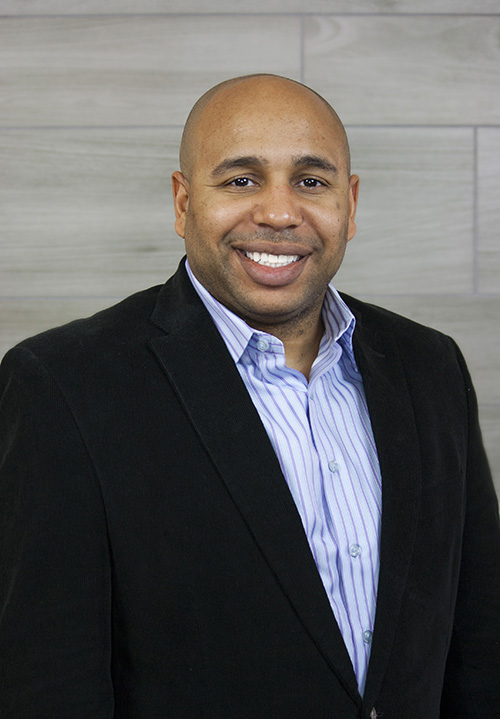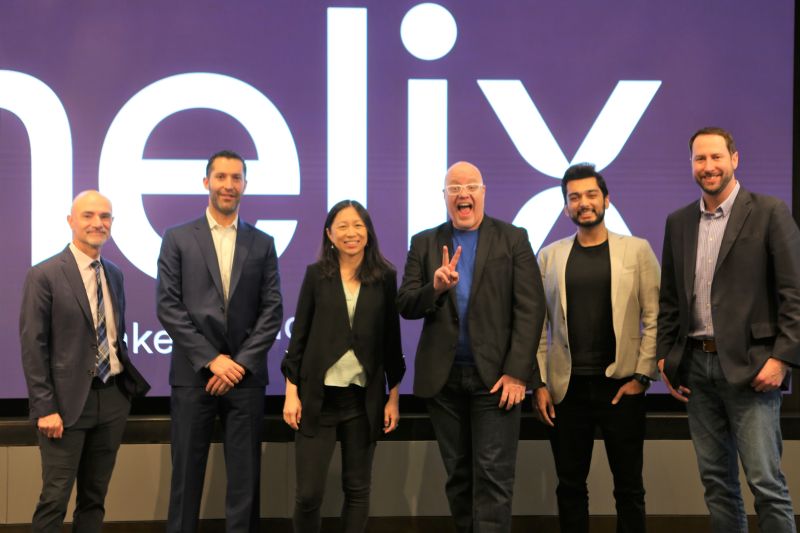This New Small Business Lending Tech Started in New Zealand
October 3, 2022 Dave Lewis, CEO at Ranqx, co-founded his company in 2015 in New Zealand. With a plan to help small businesses, accountants, and bankers all understand the financial performance of a business, the company eventually realized that such information could be used to improve the archaic small business lending process with banks.
Dave Lewis, CEO at Ranqx, co-founded his company in 2015 in New Zealand. With a plan to help small businesses, accountants, and bankers all understand the financial performance of a business, the company eventually realized that such information could be used to improve the archaic small business lending process with banks.
“The long story short is we pivoted into small business lending because we saw that banks and credit unions were broken and couldn’t efficiently lend to small businesses,” said Lewis, “and we think there’s a huge opportunity to change that going forward.”
At the time, Ranqx was focused on its own domestic market, a nation with approximately 5 million people. It was when Covid started that the company’s technology was finally understood. In 2020, for example, Lewis received a call from the CEO of Kiwibank, saying, “Look Dave I think every CEO of every bank in the world has just figured out that it’s not a good idea to have small businesses visit a branch to fill out forms for a loan because we’re in a pandemic.”
Suddenly, Ranqx became the technology behind Kiwibank’s Fast Capital product, opening the door to a lightning fast online loan application process.
“A small business can apply for working capital in under two minutes. And they’ve got a decision within three minutes of that application,” said Lewis. “Within five minutes they know whether they’re going to be funded by Kiwibank or not.”
More recently, Ranqx is expanding into North America where it sees similar opportunities to improve the loan application process. Though the target customer is still banks, the company is open to working with online lenders, which Lewis thinks can benefit from the tech as well.
“We see a lot of portals that happen in the online lending space, but we don’t see a great use of real time data of APIs, of auto decisioning,” said Lewis, “which we’ll see there are a lot of manual processes that go in there, a lot of document uploading, and a lot of, still people-time required to underwrite and manually spread the financials to be able to get a yes or no decision.”
Ranqx has also recently appointed Ex-JPMorgan Chase CIO and Treasurer John Horner as its new chairman and formed a new partnership with Visa.
“I think the key thing that I would want [the] audience to be aware of is just the alternative data sets that are now available that can be automatedly analyzed and calculated and used within an underwriting decision,” said Lewis. “And the ability to ingest that data from companies like us in an orchestrated way, is something that we can really help accelerate. At the end of the day, it doesn’t matter whether you’re a bank or an online lender, the key fundamentals are, ‘who am I listening to and how likely am I going to get repaid?’”
New York is Funding Seed Grants and Lendistry is Powering It
September 27, 2022 “The pandemic has had profound impacts on our economy and our small and micro businesses were among the hardest hit, especially in New York State,” said Hope Knight, Empire State Development President, CEO and Commissioner. “Supporting our State’s small businesses has been a priority of Governor Hochul’s administration and the steps taken to expand eligibility and get funding out the door has helped countless businesses stay on track.”
“The pandemic has had profound impacts on our economy and our small and micro businesses were among the hardest hit, especially in New York State,” said Hope Knight, Empire State Development President, CEO and Commissioner. “Supporting our State’s small businesses has been a priority of Governor Hochul’s administration and the steps taken to expand eligibility and get funding out the door has helped countless businesses stay on track.”
Empire State Development created the NY State Seed Funding Grant program to help rebuild the small business community and they chose Lendistry to administer this program and distribute grants to businesses that qualify. As for how they picked Lendistry, it probably helped that they had their foot in the door as they previously won an RFP from the State to roll out the Covid-19 small business recovery grant.
“…based on the relationship related to that program and working together, when an opportunity came for the New York Seed program, naturally, Lendistry raised our hands,” said Everett K. Sands, CEO at Lendistry.
Lendistry is the only lending company working on this project with ESD and the portal to apply for a grant is already open. When the pandemic started, more than 2,800 businesses permanently closed in New York City within the first five months alone. With this grant, Hope Knight believes that this will move the economy in a stronger direction going forward.

“The $800 million Pandemic Small Business Recovery Grant Program and now the new Seed Funding Grant Program marks unprecedented support for New York State’s small businesses and for our economic success moving forward,” said Knight.
With numerous social media ad campaigns and marketing exercises taking place over the next couple weeks, ESD wants to allow every small business a chance to take advantage of this opportunity. The grant can be found under nyseedgrant.com where a list of eligibility requirements is listed as well as an application guide that can be downloaded in various languages. After some initial forms, businesses are then instructed to upload documentation, and if approved they get a grantee agreement to be signed.
“The grant amounts are going to depend on revenue and what we call that revenue we also call gross receipts. And so, depending on their gross receipts, they can receive up to 10% of their gross receipts or about $25,000 or less,” said Sands.
Given that some people improperly applied for the PPP and EIDL programs, Lendistry is monitoring who is eligible for these grants so a repeat of that does not happen.
“I think fraud has to do with a couple of things, has to do with how you handle your Know-Your-Customer, which is also called KYC and Know-Your-Business, KYB process,” said Sands. “Lendistry is pretty robust in terms of how we handle those two processes in terms of kind of who we let in the front door. Naturally, the fraudster would also have to provide the documentation that’s required of the program, and then Lendistry also has technology that kind of cross reviews those who were I’ll just say ‘bad’ in a previous program.”
They Grew Tremendously Through the Pandemic and Landed on the List
September 26, 2022 Inc recently dropped the latest annual list of the fastest growing small businesses in the country. These 5,000 businesses span across a range of industries including health, financial, IT services and more. Companies such as Fundomate, Fountainhead, and Business Lending Blueprint have been featured on this year’s list due to incredible growth.
Inc recently dropped the latest annual list of the fastest growing small businesses in the country. These 5,000 businesses span across a range of industries including health, financial, IT services and more. Companies such as Fundomate, Fountainhead, and Business Lending Blueprint have been featured on this year’s list due to incredible growth.
For Sam Schapiro, the grit to grow Fundomate through a pandemic stemmed from a realization he came to years earlier.
“I think one of the best lessons I learned when I launched Fundomate, I was in Las Vegas at a conference to raise money,” Schapiro said. “…and barely anybody looked at us and I literally left with nothing.”
Full of doubt, Schapiro had lunch with someone he respected that had built several successful startups. That mentor told him that despite what he thought, 99.9% of the people pitching their business at the show were going to fail regardless, even if they really wanted success.
“So if you don’t really really really want it, then don’t bother doing it, because your chances of success are so slim,” Schapiro was told. That hard dose of advice led Schapiro to first question how bad he wanted it and he realized he was fully committed to seeing it through.
“I always say that if I knew how long it would take us to get here and how hard it would be to be down this road, I’d never get on the road,” Schapiro said. “But that’s the thing about life in general. Anything worth having and anything worth doing requires consistency and determination. And over and over and over again. So if something’s not working, and you can obviously see it’s not working and it’s clear, you know, the job is to keep looking at it, and at the point where it becomes a clear message that it just doesn’t work, then you got to pivot.”
Fundomate is a white label funding and banking platform for wholesale processors and MCA funders to automate their funding in a scaled way. Schapiro says that success was due in part to their technology, which collects a true daily percentage of a business’s sales.
As the pandemic subsided “we didn’t have to get back on the phone with every merchant and say, ‘Hey, we want to increase our daily payment again’ because we’re not on daily payments, we’re on instant collections that are happening on a daily basis,” Schapiro explained. “As soon as their sales came back up and even grew to get through the 2021 boom, all the sudden collections happen faster.”
Meanwhile, for Chris Hurn, Founder and CEO of Fountainhead, he had to refocus his non-bank small business lending company into a PPP loan operation.
“Pivoting our business solely to do PPP loans over the last two years was a pretty challenging experience,” said Hurn. “And we did, we worked ridiculous hours. I mean I averaged about three to four hours of sleep a night for months at a time every day. So, you know, that was probably the biggest challenge we had.”
But the work paid off. Hurn said that they were one of the most active PPP lenders over the last two years, making approximately 300,000 loans.
“Obviously, that helped accelerate our growth,” said Hurn, “as well as many of our full time hires that we made during that time are still there. And we’re still growing now.”
The process is no walk in the park when it comes to being listed on the Inc 5000. Thousands of companies apply annually to be ranked on the list. It’s months of lengthy paperwork and long-waited verifications. After realizing that one’s company has made the list, they find out their ranking along with the rest of the world.
“It’s a painstaking process because you can’t just apply and claim that you’re a growing company,” said Oz Konar, Founder at Business Lending Blueprint. “Your CPA needs to send them income verification or revenue verification, and all the things need to be documented and signed off on so they can actually prove that you’re a growing company, and you can make it on the Inc 5000.”
The hardest part of newfound success is maintaining it. With massive growth over the past four years, Konar believes growth happens when you have happy customers. Focusing on democratizing the lending space for new and existing brokers has drawn clients into his business.
“When you do things the right way consistently and stay laser focused on one problem, one solution, one product, that’s what brought us to the Inc 5000,” said Konar. “And to our surprise, we were hoping that we were going to be ranking about 1,000, the first 1,000 companies. We ranked in 799. So, it’s such an honor, we’re so happy, and we’re just getting started.”
In the competitive industry of finance that is always changing and rearranging, SMB finance companies may feel pressured to do all things for all people. But sometimes it may be more beneficial to stick to what one is good at. As Hurn can agree, it is much more complicated to compete in every marketplace.
“I think if you as a business, if you’re starting out, you need to definitely focus on a niche you want to attack and try to be the best at that,” said Hurn.
Finance Isn’t the Only Thing Being Embedded, This ‘Embedded Insurance Technology’ Company is Genius
September 22, 2022 Ever notice the check box to protect a flight? That’s Cover Genius! The New York-headquartered insurtech company is embedding insurance by providing protection directly to the user of a platform. This can be done at sign-up, checkout, or wherever the offer seems relevant to the user. Alex Sklar, VP of Strategic Partnerships, describes the process in numerous examples such as adding rental protection at the moment you’re paying a security deposit, adding car insurance at the time you’re buying your car, or adding any type of commercial insurance lines at the moments when you’re scaling up your business.
Ever notice the check box to protect a flight? That’s Cover Genius! The New York-headquartered insurtech company is embedding insurance by providing protection directly to the user of a platform. This can be done at sign-up, checkout, or wherever the offer seems relevant to the user. Alex Sklar, VP of Strategic Partnerships, describes the process in numerous examples such as adding rental protection at the moment you’re paying a security deposit, adding car insurance at the time you’re buying your car, or adding any type of commercial insurance lines at the moments when you’re scaling up your business.
“And so, the new way of doing things when we think about embedded insurance, is customers get customized protection directly from their favorite apps, platforms and brands, at the same time that the major life events or transaction is happening,” said Sklar.
Their direct customers range from many well-known digital companies in the BNPL market as well as retail, travel, and bank partners. They work in a B2B2C and B2B2B fashion, internationally, not just in the U.S.
“So, we’re protecting the end use customers of our partners,” said Sklar. “You know, some of those partners are the Buy Now Pay Later, Zip, into Intuit QuickBooks, eBay Wayfair, Ryanair for booking holdings. So really, for us, we take an insurance agnostic approach. And it’s really a question of being able to pair that protection at the right moment when it’s relevant.”
With many events or natural disasters that could potentially put businesses out of business, Cover Genius ensures customers that they are protected. And for retail customers they offer product protection and product warranty.
 “That’s where that being able to have that protection at that moment removes the trepidation from the customer making the purchase knowing that the product will be protected,” said Sklar. “So, there’s all different types of ways that we actually work with our partners to protect their end customers.”
“That’s where that being able to have that protection at that moment removes the trepidation from the customer making the purchase knowing that the product will be protected,” said Sklar. “So, there’s all different types of ways that we actually work with our partners to protect their end customers.”
Like any company, there’s always challenges to be faced, especially when introducing new ways to do things. And in the insurance industry there are rules and regulations to be complied with even when attempting to deliver it in a more efficient way.
“I think that there’s also, just in general, anytime you’re taking on a large legacy industry, you’re always going to have a little bit of challenges you know, of showing people that there are new ways to do things,” said Sklar. “But I think the size and breadth of the partners we work with show that we’re able to overcome these challenges.”
Finding more ways for their end users to add protection to purchases, Cover Genius recently launched a collaboration with Zip to allow customers to protect their purchase at checkout. They will also provide transaction monitoring that monitors the transactions recently made for the items post-purchase.
“So overall, the future will give Zip Pay and Zip Money customers the ability to add protection to their Zip purchases, either during checkout or after checkout on select purchases, making it an affordable and timely alternative,” said Sklar.
Has That Doc Been Tampered With? Ocrolus Will Detect it
September 20, 2022 Building off its original technology, Ocrolus has added a new fraud detection solution called Detect.
Building off its original technology, Ocrolus has added a new fraud detection solution called Detect.
“Detect uncovers document fraud and provides high-quality, decision-ready data that helps lenders minimize risk and prevent unnecessary losses,” said David Snitkof, Head of Analytics at Ocrolus. “With Detect, we’re able to show lenders when editing software was used, and if things like account number, account holder, dollar amounts, and more have been edited on a document.”
This analysis can be performed through the Ocrolus dashboard or API so that can lenders can review it and make a qualified decision. Tampered areas of a document are highlighted in red.
“In some cases, we’re able to uncover the original document and show it side-by-side with the tampered document,” said Snitkof. “This paints a vivid picture of how fraud is taking place.”
Snitkof believes Detect will be an asset to the company as they have already seen tremendous impact with their customers.
“For a leading small business lender, we were able to identify file tampering on 21% of confirmed fraud losses. Detect would have saved the lender over $1.2 million. That’s a significant return on investment,” said Snitkof.
To be clear, the company had previously provided customers with a fraud detection solution and this is merely a significant update.
“Fraudsters are constantly innovating and developing new techniques to misrepresent the truth and steal lenders’ capital. Even when they manipulate a document, it is often a high-quality forgery, where there would be no way for a human reviewer to identify any inconsistency,” said Snitkof.
Recent occurrences and the increase in fraud have ignited Ocrolus to improve their tools.
“People often take others’ financial documents, modify the information, and pass it off as their own. Sometimes, a fraudster will create cash out of thin air – for instance adding digits to a transaction amount – and then also change all the other numbers on the statement so that all the numbers reconcile perfectly,” said Snitkof.
Let’s Get Personal! (In Sales)
September 16, 2022 “Personalization is adding that human element to a buying process that can traditionally feel either very stressful or cold and clinical,” said Taylor Hicks, Creative Strategist at Elevate Funding. “It’s about recognizing that clients (and prospects) are humans with their own unique set of needs and goals.”
“Personalization is adding that human element to a buying process that can traditionally feel either very stressful or cold and clinical,” said Taylor Hicks, Creative Strategist at Elevate Funding. “It’s about recognizing that clients (and prospects) are humans with their own unique set of needs and goals.”
Working in this industry and communicating with clients is a given but being personable with each one encountered is a task within itself. No client wants to be victim to a boring sales call where the one pitching lacks a persuasive personality. And nobody wants to be on the other end of the call feeling like they are wasting their clients’ time with a dull sales pitch. Making the client-to-business communication an eventful experience for both parties comes with a great amount of pressure, and it also can make or break a deal.
“Be a human being. Don’t do the high-pressure sales things like some of these guys are doing,” said Alexander Gold, CFO at Future Funding. “I get compliments that my guys are not doing that, and I feel like it’s just timing. So, if your timing is good, people will give you the shot. If your timing is bad, you won’t get the shot…”
The client needs to know that they can fully put their trust into a company or product, and it will be worthwhile. Creating a mutual trust, especially when dealing with a person’s finances can be a very personal experience. The key to that can be very simple, as Gold says, to tell them who you are and how you can help with just a moment of their time.
 “So first, you have to build credibility, I would say that’s the most important thing is building credibility,” said Gold. “That could be knowing something they don’t, showing them something or teaching them something that you can prove and then possibly show them as well. I would say products, being very knowledgeable in your products and your product base.”
“So first, you have to build credibility, I would say that’s the most important thing is building credibility,” said Gold. “That could be knowing something they don’t, showing them something or teaching them something that you can prove and then possibly show them as well. I would say products, being very knowledgeable in your products and your product base.”
“…[It’s] how do you provide them interesting insights into their finances or into their needs without coming across overbearing or selling them something that they don’t need?” said Greg Varnell, VP of Product and Development at Q2. “And that’s a real balance. And so, I think, for us, personalization isn’t just trying to sell somebody something, but it’s trying to tell them the information that they need when they need that information.”
“I think trust has to be earned,” said David Roitblat, Founder and CEO at Better Accounting Solutions. “Most of our clients are referral based from other clients. So I guess that speaks for itself. […] So that does give us a head start on that, but ultimately, people judge you based on your work.
“At Elevate, we take a custom-tailored approach for each client,” said Hicks of Elevate. “We send out newsletters to our clients biweekly to remind them of our various programs, like add-ons and renewals. We are proactive in reminding them of their Future Receivables Sales Agreement, and we’ll always work with them on reducing their payment amount if their revenue drops. We provide our clients a variety of ways to get ahold of us – whether that’s email, call, text.”
Regardless of your role in the finance industry, interactions can have long lasting impacts. From the initial meeting to developing trust, and eventually turning that journey into a meaningful working relationship. And who knows, that one great client interaction could lead to many referrals and recommendations in the future.
Monday through Fund-day
September 8, 2022 Nothing screams excitement like a brand-new week filled with endless funding opportunities. Regardless of the type of funding, the ultimate goal is to find clients in need of capital and spring to action quickly.
Nothing screams excitement like a brand-new week filled with endless funding opportunities. Regardless of the type of funding, the ultimate goal is to find clients in need of capital and spring to action quickly.
“I would say Tuesday is like, a day that things get done,” said Michael Krepak, CEO of FlexCap Solutions. “People always talk about Friday’s a closing day. I’ve had a lot of success on Fridays as just like a funding day, like when the deals actually get done afterwards in all the underwriting and the back and forth and stipulations. So, Tuesdays and Fridays…”
Fridays may be hectic for some professionals in the business who are trying to close out a deal before the weekend is over. The pressure to close a deal can create competition within oneself to finish the week off strong or to make sure that nothing ruins it over the weekend.
“There’s always a push to get everyone funded right before the weekend, you don’t want deals rolling over,” said Brendan P. Lynch, CEO at Sharpe Capital. “Too many things can happen: negative days, they can go negative, and then the login, they have to redo it. And you know, the deal can die on Monday. So, you always want to get everything done before the weekend. That’s for sure.”
For equipment finance consultant Cheryl Tibbs, if she is able to finish funding by Thursday, she uses Fridays to either spend quality time with loved ones or to promote her business.
“I’m a bit different than most. I start off strong on Mondays and relax on Friday,” said Tibbs. “When I’m done Thursday, late Thursday evening, Friday is reserved for deals that will fund that day. If I don’t have anything booked for a Friday funding, I usually chill on Fridays and use that for marketing or family time.”
Sonia Alvelo of Latin Financial was non-committal to a day. “What gets us excited is the satisfaction of a job well done…” Alvelo said.
Krepak meanwhile, explained that if you’re working on commission, then there is an incentive to keep going strong every day. “Like every day, you want to do something every day,” he said. “It’s just a competitive face to begin with.”
What The Collaboration Between Helix by Q2 and Ubiquity Means
August 31, 2022 With the rising phenomenon of embedded finance springing across the industry, Helix by Q2 and Ubiquity have partnered together to help non-bank companies embed financial services inside of their existing offerings. Headquartered in Austin, TX, Helix by Q2 gives fintechs and brands the building blocks of banking such as accounts, cards, payments, data and more. New York-based Ubiquity, meanwhile, provides end-to-end solutions for customer experience management, back-office operations, and business transformation.
With the rising phenomenon of embedded finance springing across the industry, Helix by Q2 and Ubiquity have partnered together to help non-bank companies embed financial services inside of their existing offerings. Headquartered in Austin, TX, Helix by Q2 gives fintechs and brands the building blocks of banking such as accounts, cards, payments, data and more. New York-based Ubiquity, meanwhile, provides end-to-end solutions for customer experience management, back-office operations, and business transformation.
“We did a ton of diligence looking at all of the different players in the space and we felt that Ubiquity was the best partner for us and also for our partner prospects to help them build personalized managed services at scale so that they can focus on launching an excellent and unique product,” said Ahon Sarkar, General Manager of Helix by Q2.
Sarkar expressed the importance of personalization when customers are seeking assistance so that (1) they can be directed to the right person for their matter and (2) so they can make the overall customer experience beneficial to the services they’re seeking. The “cookie-cutter” customer service experience, as he described it, doesn’t always mesh with a brand’s identity. Ubiquity, however, goes the extra mile in Helix’s view in maintaining that brand pesonalization.
Matt Agronin, Chief Marketing Officer at Ubiquity, said that when it comes to dealing with financial products in particular, it becomes incredibly personal, that there’s nothing more personal than that.
“[…] when things seem too complex, or you’re getting piecemeal answers in your journey, when you’re a customer and you’re seeking to find answers, technology solutions that are robust, clear and unified, and a customer service organization that understands and empathizes with the customer’s situation are what are going to yield best,” Agronin said.
The collaboration is supposed to make for a smoother experience for customers to be led in the right financial direction when adding embedded finance as a service to what they already have.
“We’re taking the elements of banking and making it so that people can use those building blocks of finance, to create unique products, to create unique experiences,” said Sarkar, “and embedded finance is kind of what our customers are doing with it. They’re taking the banking products and they’re embedding it inside of their existing business in order to make things unique that you couldn’t make without being that type of business.”
With the strategy of providing better customer service, Agronin agrees that having Helix as a partner allows both companies to manage customers and grow in relationships with brands.
“At Ubiquity, we’re here to help brands scale fearlessly,” Agronin said. “So that means providing world class and dedicated CX brand ambassadors and seasoned banking operational professionals to help these fintechs grow their business and their customers. So, we’re here to help them in the background, take away parts of the business that they may not be able to handle right now given their size, or parts of the business that are not their core skill set so they are able to focus on their actual business and the product roadmap and we can help manage the customer.”






























